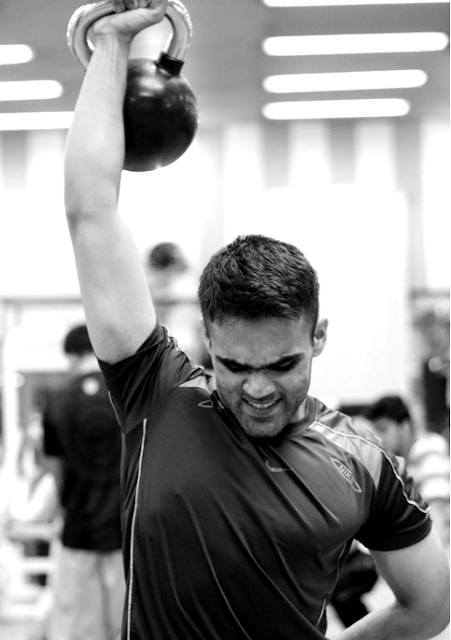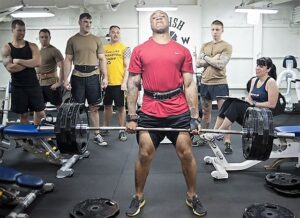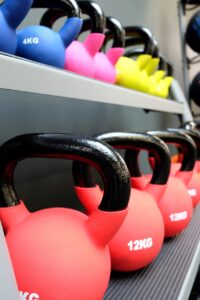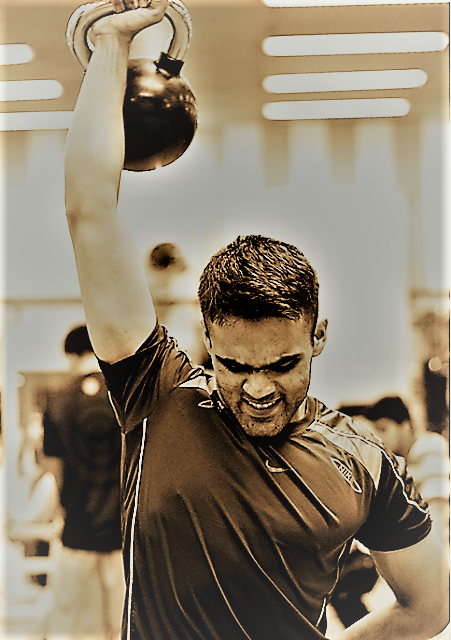Embracing Functional Fitness, Unleashing Your True Potential in 2025
functional fitness, true potential, CrossFit, supplementation, military-inspired fitness, functionality over appearance

Functional fitness is a classification of training that prepares the body for real-life movements and activities. Also known as functional training or functional movement, “It trains your muscles to work together and prepares them for daily tasks by simulating common movements you might do at home, at work, or in sports.” – Mayo Clinic. Movements such as squatting, reaching, pulling, and lifting will be made easier with functional fitness integrated into your exercise routine. According to WebMD.com, functional fitness is focused on building a body capable of doing real-life activities in real-life positions, not just lifting a certain amount of weight in an idealized posture created by a gym machine. For example, you could be deadlifting 400+ pounds in the gym, but when you go to put a suitcase in the back of your car, you throw your back out. Or, you can bicep curl with 50-pound dumbbells with perfect form but picking up your child makes you pull a muscle. If either of these things sounds like you, it may be time to incorporate functional fitness training into your routine.
Me in brief
Venturing from an amateur boxing background into the realm of fitness coaching has blessed me with the opportunity to train in gyms spanning four different countries, alongside professionals hailing from diverse disciplines. These invaluable experiences have enriched my knowledge and comprehension of physical fitness, solidifying my conviction that the human body possesses the capacity for much more than simply building isolated muscle groups through heavy lifting. Our bodies are designed to conquer mountains, traverse vast oceans, and traverse countless miles before fatigue takes hold. This, I firmly believe, epitomizes the true essence of fitness.
The main differences among Body fitness, Functional fitness, and Bodybuilding, and their short/long term effects on the human body with the help of a chart highlighting the salient features of all three for better assimilation/understanding
- Body fitness is a general term that encompasses all aspects of physical fitness, including cardiovascular health, muscular strength, flexibility, and body composition.
- Functional fitness is a type of body fitness that focuses on exercises that improve the body’s ability to perform everyday tasks. These exercises typically involve compound movements that work for multiple muscle groups.
- Bodybuilding is a type of body fitness that focuses on increasing muscle mass and improving muscular definition. These exercises typically involve isolation exercises that target specific muscle groups.
-

Body Building
Which is right for you?
The best type of body fitness for you depends on your individual goals and needs. If you are looking to improve your overall health and well-being, then body fitness is a good option. If you are looking to improve your ability to perform everyday tasks, then functional fitness is a good option. If you are looking to increase muscle mass and improve muscular definition, then bodybuilding is a good option.
It is important to note that there is no one-size-fits-all approach to body fitness. The best way to find the right type of body fitness for you is to talk to a qualified personal trainer or fitness instructor. They can help you assess your individual and create a fitness plan that is right for you.Here is a table that summarizes the main differences between body fitness, functional fitness, and bodybuilding:
|
Category |
Body Fitness |
Functional Fitness |
Bodybuilding |
|
Goal |
Improve overall health and fitness |
Improve performance in everyday activities |
Increase muscle mass and size |
|
Exercises |
Aerobic exercise, strength training, flexibility exercises |
Compound exercises that mimic everyday movements |
Isolation exercises that target specific muscle groups |
|
Frequency |
3-4 times per week |
3-4 times per week |
4-6 times per week |
|
Intensity |
Moderate |
Moderate to high |
High |
|
Short-term effects |
Increased energy levels, improved mood, reduced stress, weight loss |
Increased strength, endurance, and coordination |
Increased muscle mass and size |
|
Long-term effects |
Reduced risk of chronic diseases, improved cardiovascular health, stronger bones and muscles |
Reduced risk of injury, improved balance and mobility, better athletic performance |
Increased muscle mass and size, improved appearance |
As you can see, there are some key differences between these three approaches to fitness. Body fitness is all about improving overall health and well-being, while functional fitness is more focused on improving performance in everyday activities. Bodybuilding, on the other hand, is specifically designed to increase muscle mass and size.
The short-term effects of each type of fitness vary depending on the individual and their goals. However, in general, all three types of fitness can lead to increased energy levels, improved mood, and reduced stress. Body fitness and functional fitness can also lead to weight loss, while bodybuilding can lead to increased muscle mass and size.

The long-term effects of each type of fitness are also somewhat different. Body fitness can help to reduce the risk of chronic diseases, improve cardiovascular health, and strengthen bones and muscles. Functional fitness can help to reduce the risk of injury, improve balance and mobility, and improve athletic performance. Bodybuilding can help to increase muscle mass and size and improve appearance.
Ultimately, the best type of fitness for you will depend on your individual goals and preferences. If you are looking to improve your overall health and well-being, then body fitness may be a good option for you. If you are looking to improve your performance in everyday activities, then functional fitness may be a better choice. And if you are looking to increase muscle mass and size, then bodybuilding may be the right fit for you.
The CrossFit Conundrum: While my admiration for CrossFit is unwavering, and I incorporate certain CrossFit workouts into my routines, there exists an inherent challenge. CrossFit movements often entail complexity and carry a heightened risk of injury if executed without the watchful eye of certified and trained coaches. Moreover, CrossFit remains confined to select regions and is gradually gaining popularity. The speed at which CrossFit permeates mainstream consciousness hinges on the broader perception of the fitness concept.
Supplements and Nutritional Requirements: Though I am not an ardent proponent of supplementation, I acknowledge the limitations of solely relying on conventional food intake to satisfy our bodies’ nutritional demands. I endorse the judicious use of specific supplement categories to bridge this nutritional gap. However, it is paramount to recognize that supplements may elicit varying effects on individuals. Factors such as age, body type, and personal aspirations must be taken into account when selecting suitable supplements. Additionally, making informed choices is imperative as premium-quality supplements come at a price.
Functionality Trumps Aesthetics: My profound admiration for the military has spurred me to strive for a level of fitness reminiscent of Special Forces operatives. Training alongside members of the US Marine Corps, the French Army, and the esteemed SSG of the Pakistan Army, one overarching goal has always shone brightly: prioritizing functionality over mere bulks of muscle mass. Yet, it is no simple task to resist the allure of bodybuilding workouts fixated on aesthetics, which appear more accessible and prevalent. Nonetheless, the true measure of fitness lies in the ability to execute tasks that set us apart from others.

Conclusion: Embracing functional fitness empowers us to tap into our limitless potential, transcending the realm of mere muscular development and physical appearance. While CrossFit presents distinctive challenges and possibilities, its widespread acceptance hinges on society’s perception of fitness. Supplements, although not indispensable, can aid in fulfilling specific nutritional requirements; yet, thoughtful deliberation and understanding of individual needs remain crucial. Ultimately, by prioritizing functionality over aesthetics, we unlock a level of fitness accessible to only a select few. Embrace the innate capabilities of your body and unleash the extraordinary within you.
How to Eat Healthy for Less Money in 24/25

